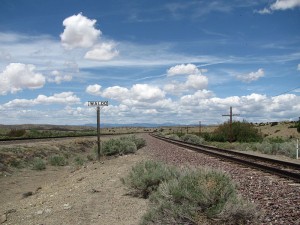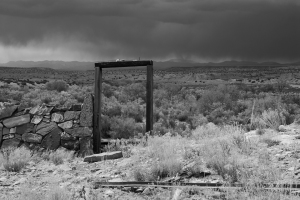
When you start wondering where a figure of speech came from, you sometimes find yourself on dark literary backroads, if not actually in BF Egypt.
It was during a search for the town of Waldo, New Mexico that my husband described our extremely rural surroundings as “BF Egypt.” And such is the nature of our car conversations on these occasions, I was shortly whipping out my iPhone in an effort to discover just why “B*** F*** Egypt” (to use the full (more or less) expression) should be a common idiom for the backside of beyond.
It was an entertaining search, during which we discovered that all kinds of cultures have an idiom that pretty much means, “Out in the sticks,” if not absolutely, “Farther away than nowhere.” The British do not use “BF Egypt,” which seemed odd in light of their expeditionary and exploratory history in the desert regions. Still, they do seem aware of their adventurous heritage: current British idiom is “in the bundu”—“bundu” being an African word (specific ethnicity unknown) meaning…well, BF Egypt.
Here (courtesy of Wikipedia and its many contributors) is a partial list of popular idioms meaning “a very remote (not to say culturally backward and/or with inhabitants given to deviant sexual practices) place”:
• Anytown, USA and Dullsville in the USA.
•
• Auchterturra in Scotland, and Glenboggin, which has its own official website.[30]
•
• Back o’ Bourke in Australia (unspecified remote place). Bourke, New South Wales was the terminus of the railway line from Sydney, thus the start of the real Outback.
•
• Bally-Go-Backwards in Ireland (unspecified remote small country town).
•
• Black Stump or also Albuquerque in Australia and New Zealand (“beyond the black stump” indicates an extremely remote location).
•
• Up the Boohai (approximately “boo-eye”) in New Zealand, occasionally given as, Up the Boohai hunting pukeko with a long handled shovel. The Boohai is a fictitious river. It is used to indicate that the answerer does not wish to respond to any question involving “where?”. Up the Boohai can also indicate that plans are apparently ruined or an item is extremely non-functional.
•
• The Boondocks (or the Boonies).
•
• BFE or Bumblefuck, Egypt (also Bumfuck, Egypt, Butt Fuck, Egypt, or Beyond Fucking Egypt) refers to an unspecified remote location or destination, assumed to be arduous to travel to, unpleasant to visit and/or far away from anything of interest to the speaker (e.g. “Man, you parked way the hell out in BFE”). In Southeastern Pennsylvania and New Jersey, this is often referred to as Japip or East Jabip/Jabib. In the Chicago metropolitan area, the term was coined to refer to the region in downstate Illinois known as “Little Egypt”, centered in Cairo, Illinois, for being the furthest from the urban center in both distance and way of life. Bumfuck is also military slang for a remote, hard to get to military base. Has been also rendered as Bumfuck, Iowa or Bumfuck, Wyoming or Bumfuck, Idaho. Bumblefuck, Missouri was popularized by the 1988 movie Rain Man.
•
• Buttcrack or Upper Buttcrack (usually a New England state).
•
• Crackerland and Jerkwater (from the 1982 film First Blood, small hometowns of typical US Army recruits).
•
• East Cupcake.
•
• East Jahunga.
•
• East Jesus.
•
• Four-Fifths of Fuck-All.
•
• Dog River, Armpit, or Moose Fuck in Canada.
•
• Hay and Hell and Booligal, an Australian colloquialism for anyplace hot and uncomfortable; made famous by Banjo Patterson’s humorous poem of that title. (Hay and Booligal are actual New South Wales communities in the Riverina.)
•
• Hickville is used to describe a small farming town. (Hick comes from hillbilly.)
•
• Loamshire for a rural county in England (and the Loamshires for a regiment based in that county).
•
• Outer Mongolia used to represent a far and distant land relatively unknown to the average person; also rendered as the imaginary country of Outer Congolia
•
• Peoria refers to provincial mainstream cities or towns in the US; typically used in expressions like “Will it play in Peoria?”
•
• Podunk in the USA.
•
• Sainte-Clotilde-de-Rubber-Boot in Quebec, Canada.
•
• The Sticks refers to a remote rural location (US + UK)
•
• Timbuktu is often used to refer to an unspecified but remote place.
•
• Tipperary can still be used to denote anywhere that is “a long way from home”.
•
• Tweebuffelsmeteenskootmorsdoodgeskietfontein used to refer to a typical South African small rural town.
•
• Ultima Thule can mean “beyond the borders of the known world” or a far-north island.
•
• Upper Rubber Boot in Ontario, Canada.
•
• Woop Woop, Upper Woop Woop, Oodnawoopwoop, or Wopwops in Australia and New Zealand (often “out Woop Woop” as in, “they live out Woop Woop somewhere”, and used when referring to people who live in a country area unfamiliar to the speaker).
•
• Waikikamukau (pronounced “Why kick a moo-cow”) in New Zealand.
Oh, Waldo, New Mexico? It’s way the heck out in BF Egypt. [g]*
*Actually, Waldo is even farther away than that. One of New Mexico’s small ghost-towns, the entire place was bought up by a salvager in the 1950’s and completely carted away. Nothin’ much left.

[This photo from www.ghosttowns.com, which has the complete story of Waldo.]
Correction – the word is Yehupets – and it was used by Sholem Aleichem to refer to a fictional large city – but our family has always used it to mean the back of the beyond.
When you are traveling north on Hwy 179 from the Village of Oak Creek to West Sedona you go by a street (it’s at a roundabout now) called Back o’ Beyond. I didn’t see that one on the list.
And we always used to say East Jesus, Ohio.
We New Zealanders seem to have an awful lot of obscure places for which we have names. I’m amazed you captured them all. I’m off to Waipu this weekend (“Why Poo”), but unlike Waikikamukau, it IS a Scottish settlement north of Auckland at which they are holding a Tartan Festival this weekend. Far from being Glenboggin I believe it will be a celtic metropolis. Can’t wait.
You forgot the North Forty -
We have one we use in my family — “Fukahwee”, as in “Where the f*** are we?” Does anyone else use this term? This has been a very entertaining and educational exchange!
That’s also spelled “Fugawe.” It’s the punch line of a joke about a lost Indian tribe–”We’re the Fugawe” sounds like “Where the F*** are we?”
the one in our family is “right there between nothing and nowhere”. It’s how my father-in-law described the house my daughter and her husband bought between Alamosa, CO and Monte Vista. and it was! LOL
Love, love, love this post! Coming from Brisbane, Australia I am most familiar with ‘woop woop’. Eg. oh your gate lounge is at woop woop, you had better run or you might miss your flight!
Dare I suggest another international ‘conversation’ on colloquialisms…….
I know in America you would call them, Red Necks, Hicks, or White Trash…… Here in Brisbane we call them Bogans….
Over to you…
Upper Buttcrack is my new favorite. I love the Canadian ones too, though.
Being from Southeastern PA, Jabip is right on! I have to say that the entire time I was reading this I was imagining Eric Idle’s voice!
When I was a child, a part of my family’s summers were spent on Lake Vermililion in northern Minnesota. One day, we took our boat all the way to the other end of this twenty-two-mile lake. There we found ourselves at a small resort called, “Timbuktu.” Ever since, whenever I hear or use the word, “timbuktu” in reference to a place far, far away, I think fondly about that tiny resort and our summers on the most beautiful lake I’ve ever seen.
By the way, my sister owns a tea shop in Greenwich Village, NYC, called “Podunk.” It, too, is tiny, but cozy, and she makes and serves the most incredible hand-made pastries and tea sandwiches. Be sure to stop in if you are ever in The Big Apple.
Such fun! We use “East Overshoe.” I often refer to it when I park in a remote lot at work that gives me a week’s allotment of exercise walking to and from my office.
I am embarrassed to admit that I have never heard a lot of these. Mind you I am Canadian so perhaps they are more American idioms. The first one that comes to my mind is the Back of Beyond.
Like you, Sandra, the “Back of Beyond” or “Out in the Sticks” are 2 favourites in the UK
Pusemuckel and Hintertupfingen.
JWD is my German favorite, though. Trust the Berliners to say it succinctly.
A colleague of mine always uses “Out of God’s Knowledge.”
This reminds of a new article I just read. The city of Boring, Oregon just became a sister city with Dull, Scotland. Both in the boondocks. They are having quite a bit of fun with the Dull & Boring partnership. :o)
OMG I can’t believe I didn’t know this, thanks so much for posting it! I’m from Oregon (Portland) & before moving to Florida in December, I spent the last 8 years living in Scotland so how the heck did I miss that?!?
Incidentally, in Scotland we lived outside Inverness (which you should all know). Our town was conveniently located right in between fuckall-upon-whiskyton & sheepshire… Only Americans of a certain age understood the true horror when I explained that the high street turned into Children of the Corn after about 4pm. rofl
Btw CAN”T wait for the new book, the mams and I have been eagerly squirming for over a year now! Write Diana, write!!! (or majorly evil grin as a throw back for Ms. Gabaldon to bulletin board days BEFORE internet. Yes, I AM a geek thank you!)
Ugh, I had inserted MEG between two “>” symbols but the code seems to have eaten it up, how sad…
Regarding the term, “Little Egypt”, you say “In the Chicago metropolitan area, the term was coined to refer to the region in downstate Illinois known as “Little Egypt”, centered in Cairo, Illinois, for being the furthest from the urban center in both distance and way of life.”
.
In fact, the term was in use at least as far back as the 1830′s when Chicago was a tiny settlement on the lake. You might want to check your sources.
Dear James–
Not _my_ sources. As I noted in the blog entry, I got this stuff from Wikipedia.
–Diana
I live in Québec, and I never heard of Sainte-Clotilde… maybe only the english speaking canadian use it!
The french canadians refer to “Saint-Clin-Clin-des-Meuh-Meuh” (so it would be Saint-Clin-Clin-of-the-Moo-Moos in English). We also use “aux Îles Mouk-Mouk” (Mouk Mouk Islands).
Love the post!
Never heard of Sainte-Clotilde either…
We use BFE a lot. I think I learned it, and its non-abbreviated form while in junior high. I see that Nan (above) listed “North Forty.” We use that one, too. Fun post, Diana. Thanks!
I heard on TV once, “about a hundred miles past where Jesus lost his sandals,” referring to someplace in the American SW desert.